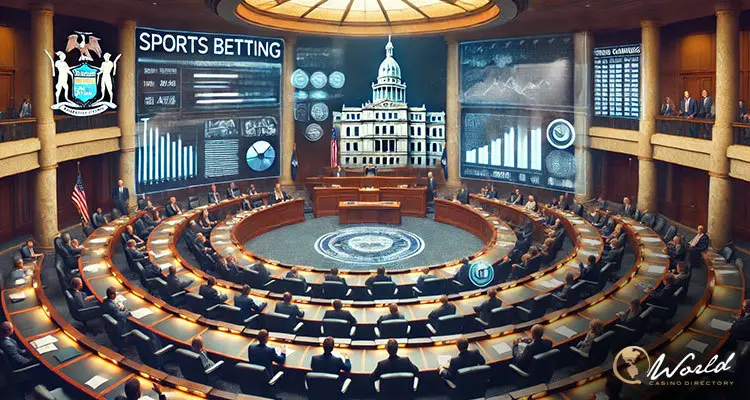Michigan lawmakers have introduced two new bills aimed at increasing taxes on online sports betting and casino operators. The proposals, Senate Bills 1193 and 1194, were brought forward on December 5 by Senators Sam Singh and Jeremy Mossand and have since been referred to the Senate Government Operations Committee. These measures would amend the 2019 Lawful Sports Betting Act and the Lawful Internet Gaming Act, resulting in small increases to the tax rates applied to gambling operators in the state.
Michigan proposes modest tax adjustments for online gambling:
Under the current system, sports betting operators pay an 8.4% tax on adjusted gross revenue while online casino taxes operate on a graduated scale ranging from 20% for less than $4 million in annual revenue to 28% for earnings exceeding $12 million. Detroit-based operators also contribute an additional 1.25% city tax.
If passed, SB 1193 (pdf) would raise the sports betting tax to 8.5%, and SB 1194 would increase each tier of the iGaming tax scale by 1%. For instance, the highest tax rate for operators earning more than $12 million annually would climb to 29%.
According to SBC Americas, the bills also propose subtle changes to how tax revenues are distributed. For sports betting, the share allocated to cities hosting operators would increase from 30% to 31%. Simultaneously, the state’s general fund allocation would drop from 65% to 63.5%, and the Michigan agriculture equine industry development fund’s share would rise from 5% to 5.5%. For iGaming, while the city’s portion remains unchanged at 30%, the state’s fund would receive 64.5%, and the equine development fund would also receive 5.5%.
These adjustments come as Michigan continues to see significant revenue generation from its online gambling market. The Michigan Gaming Control Board’s November report revealed that online casinos alone contributed $41.5 million in taxes for October. The five largest platforms — FanDuel, BetMGM, DraftKings, Caesars, and BetRivers — all earned over $12 million in adjusted gross revenue, placing them in the highest tax bracket.
A national context for gambling taxes:
Michigan’s modest proposals align with broader discussions about standardizing online gambling regulations nationwide. Recently, the National Council of Legislators from Gaming States (NCLGS) drafted model legislation suggesting an online casino tax rate of 15% to 25%, along with measures like banning credit card deposits and limiting daily deposits to $20,000.
While Michigan’s top-tier rates exceed the NCLGS recommendations, other states have implemented far more dramatic changes. For example, Illinois enacted a progressive sports betting tax in June, ranging from 20% to 40% for revenue exceeding $200 million. Meanwhile, Louisiana legislators deferred a proposal to raise sportsbook taxes to 51%, equivalent to New York’s rate, but plan to revisit it in 2025.
By contrast, Ohio recently moved in the opposite direction. A bill introduced in November seeks to revert the state’s sports betting tax from 20% back to its original 10%, reflecting concerns about competitiveness.
As budgetary pressures grow, Michigan’s incremental approach may offer a balanced path between increasing state revenue and maintaining a thriving gambling market. While the bills do not detail specific motivations for the tax increases, they come at a time when other states are exploring aggressive tax strategies.
David Rebuck, a former regulator in New Jersey, has highlighted the potential for online gambling to generate significant tax revenue, citing New Jersey’s $414 million contribution from iGaming taxes in 2023, according to the Associated Press. Similar budget considerations are likely to drive Michigan and other states to reassess their gambling tax policies.
If Michigan’s bills pass, the changes could set a precedent for other states weighing adjustments to their own gambling frameworks. With online gaming growing nationwide, lawmakers are increasingly looking to fine-tune regulations to balance state revenue needs with industry sustainability.



